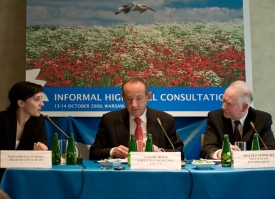

Deliberative democracy
Making the case in Poznan

Taking the case to Poznan
Poland was the next step in global climate change negotiations
which will culminated in Copenhagen in 2009. With the looming
economic crisis, a shift back towards urgent climate action was
vital. Poland was aligning with lower income European economies in
a push towards weaker EU agreements, so putting climate action on
the map in Poznan was vital.
Green Cross International contributes to Polish
position
In this context, Green Cross Australia was delighted that our
international delegation to the 14th Conference of Parties between
December 1st and 12th 2008 was led by the Chair of our
International Board of Directors, Dr. Jan Kulczyk.
Dr. Kulczyk is one of Poland's most successful entrepreneurs continuing a family business tradition into the second generation. Dr. Kulczyk is a law graduate of Adam Mickiewicz University in Poznań as well as a graduate of foreign trade at the University of Economics in Poznań. He holds a Ph.D. in international law.
One of his achievements is dear to the hearts of environmentally minded Australian beer lovers!
Dr. Kulczyk has created one of the most successful Polish rooted investment companies. He is a major shareholder of one of Poland's biggest breweries - Kompania Piwowarska - which is one of the world's most efficient beer producers using the smallest amount of water in the world. Kompania Piwowarska built the waste water treatment plant in Tychy that reduces biological discharge in the brewery's waste water system by 80%.
The National People's Assembly - a humanitarian message to
motivate Poznan action
What better way to communicate the views of Australian citizens
than through University student leadership. Green Cross Australia
volunteer Hugh Jorgensen was completing a dual degree at the
University of Queensland in Economics and International Relations,
and he presented the recommendations of the National People's
Assembly Citizen's Panel at Poznan in December 2008.
Here's what Hugh thinks and what he's doing about it:
"Australia has one of the highest rates of youth volunteering in the world and it's important that we continue to work on improving the world that we and future generations will inherit. The bulk of my time has been occupied with developing the 'Model United Nations' concept in Australia.
With a group of fellow students I assisted in coordinating the inaugural Brisbane Model United Nations and I'm presently co-coordinating the Asia Pacific Model United Nations Conference, to be held in Brisbane from July 12-19, 2009.
The latter event will attract up to 600 participants from around the world and will address a range of issues related to Climate Change such as the spread of global disease, bringing renewable energy to developing countries and addressing the problem of Climate Refugees in the South Pacific."
Hugh presented our recommendations and action plan
in Poznan.
- Green Cross International - Green Cross International's side event will include a panel at Poznan that will stress the need to action especially during economically uncertain times. Hugh will underpin this focus with our urgent human message supporting GCI's forum.
- United Nations University Institute for Environment and Human Security - Building on a strong tradition of working within the UN system, Green Cross Australia is delighted that Hugh will contribute to a side event at Poznan hosted by the United Nations University together with the International Organization for Migration, UNEP, United Nations University, and Munich Re Foundation. This forum will focus on climate change and migration, and Green Cross Australia is grateful to Heinrich Eder, Managing Director of Munich Re Asia Pacific for his tremendous personal contribution to the National People's Assembly.
- Towards a convention to address climate displacement - Following on from the National People's Assembly where law reform addressing displacement was a key focus (building on the expertise of Dr. Jane McAdam from the University of New South Wales), Green Cross Australia has connected with David Hodgkinson a leading lawyer from West Australia who together with academic and business colleages has produced a research note on climate change refugees - 'Towards a Convention for Persons Displaced by Climate Change: Key Issues and Preliminary Responses'. Download the Research Note from the Resources Section. Hugh will contribute the findings of the National People's Assembly as part of this side event.
Copyright © Green Cross Australia | Terms & Conditions | Privacy Policy
web design brisbane :: (zero)seven
